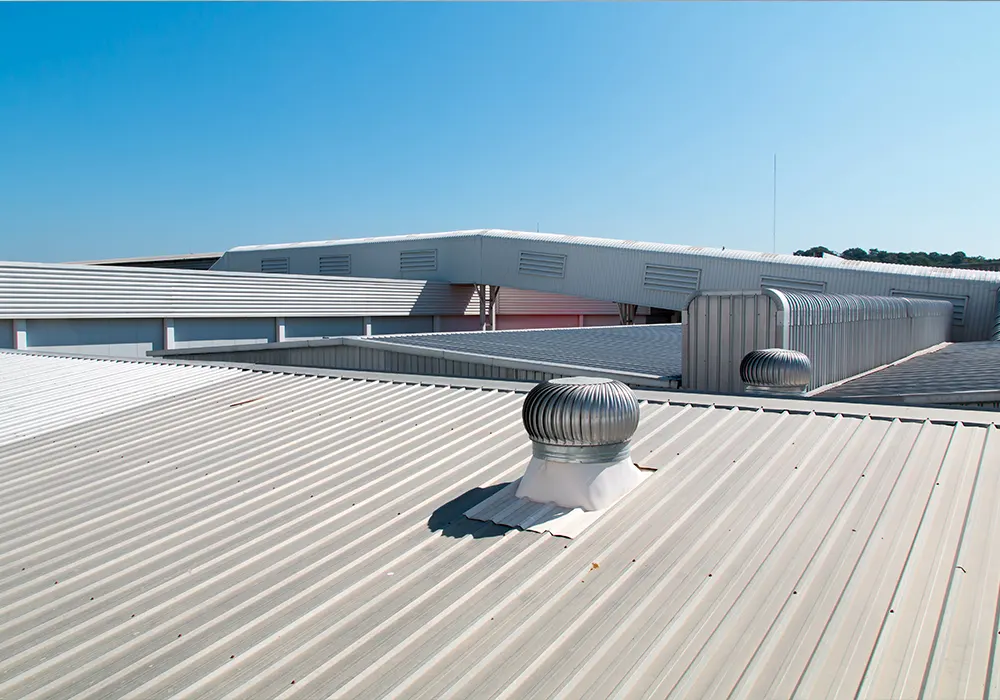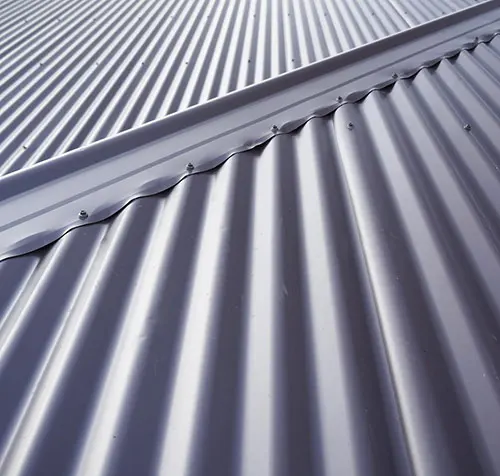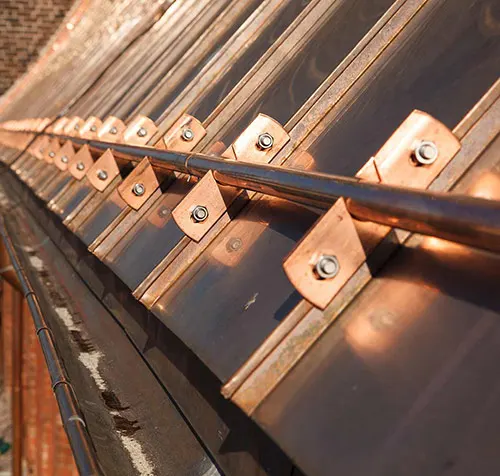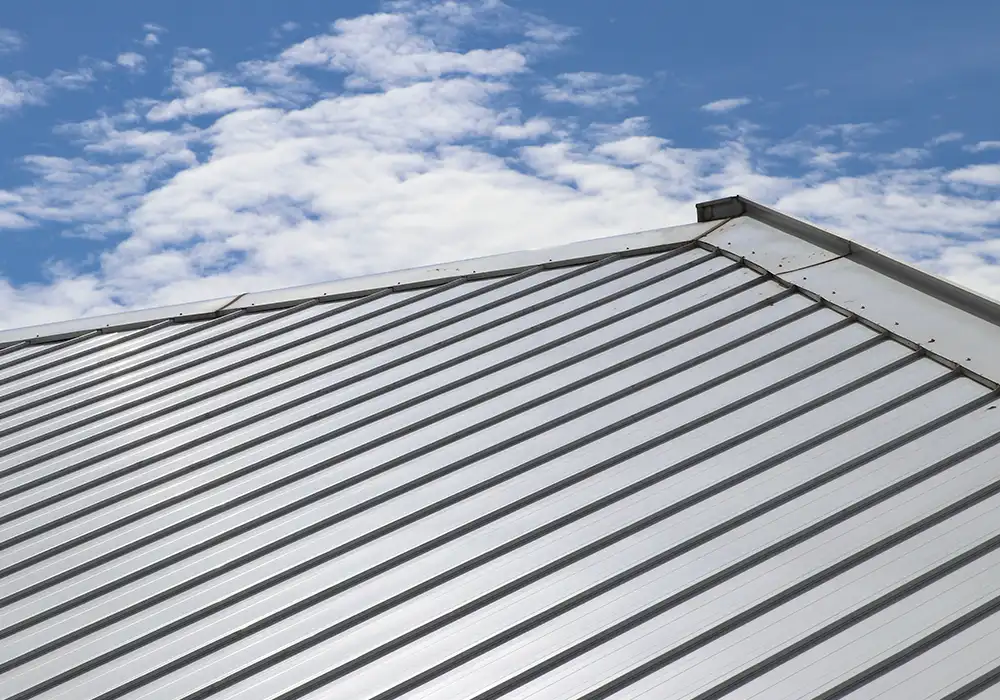Metal Roofs

What is Metal Roofing?
The metal roof system consists of metal sheets, panels or tiles that serve a highly utilitarian purpose but also have aesthetic value. Though metal roofs have been used for centuries, it’s becoming one of the more prevalent types of roofing for commercial and industrial buildings. The lower lifetime cost, energy savings and sustainability are cited as some of the most compelling reasons for business owners to choose a metal roof for their commercial building.
Northeast Industrial Roof is 100% focused on commercial and industrial roofing, and we’re dedicated to helping you find the right type of roof for your commercial building.
Types of Metal Roofs
Steel
Galvanized steel is composed of an inner steel core and an outer layer of zinc to protect the core from corrosion and extend the life of the roofing.
Galvalume steel is similar to galvanized steel, except the coating is a blend of zinc and aluminum. This blend further protects the roofing from corrosion.
Weathering steel is not ideal for use on structural roofing, but is often used on accent roofs and with the understanding that weathering steel is designed to intentionally rust to create a protective outer layer that does require specific maintenance.


Zinc
Aluminum
Copper
Advantages of having a Metal Roof
Aesthetic flexibility & Cost-effectiveness
While aesthetics don’t play a large role in many flat-roof decisions, as a flat roof isn’t immediately visible to a street-level viewer, metal roofing is available in a variety of panel widths, paint colors, reflective coatings and fastener style. Additionally, metal roofing is available in different types of metal, such as aluminum, copper, and steel.
The extended lifespan of metal roofing in comparison to other roofing materials means that metal roofing provides a greater value over its lifetime than other materials. Combined with the potential energy savings due to the roof’s solar reflectivity, its longer lifespan makes metal roofing an incredibly cost-effective choice.
Energy-efficiency & Lightweight
Metal roofing is inherently reflective, resulting in a cooler building temperature and, thus, lower energy consumption. Properly attached, these systems can save 15–40% on energy charges and contribute to a reduction in the heat island effect that often forms in populated cities. The lighter in color the metal, the more reflective it will be.
One of the selling points of metal roofing systems is the fact that they’re inherently lightweight, which means they won’t create added stress to the integral structure of the building – very important for some older, larger structures. This property also means that a metal roof can often be installed directly over an existing roof, saving on tear-off costs.
Durability & Environmentally friendly
Properly installed, metal roofing is superior to other roofing materials in terms of resistance to: Wind uplift, Water penetration, Punctures, Mold, Rodents & Fire.
Most metal roofing consists of recycled material and is itself 100% recyclable at the end of its useful life.
Longevity & Low-maintenance
Metal roofing systems are designed to last much longer than other roofing materials. On average, a commercial metal roof can last 30–40 years; however, some metal roofs have been known to exceed 100 years.
Metal roofing is easy to clean and maintain; in fact, it’s the only roofing material that can be steamed or pressure-washed annually. Keeping the roof clean and free of debris buildup allows it to remain optimally reflective as well as extends the life of the roof.
Metal Roofing Assembly
Standing Seam
Crimped

Metal Roofing Myths Debunked
Myth: They are cost-prohibitive.
Fact: While metal roofs cost more initially, when you factor in the cost savings from lowering the building’s energy consumption as well as the length of the roof’s lifetime, a metal roof is actually the more cost-effective option. Metal roofing is also virtually maintenance-free, resistant to mold and won’t typically need any repairs performed throughout the life of the roof.
Myth: They attract lightning.
Fact: Lightning will strike whatever is closest, whether that is a tree, telephone pole or weather vane. In fact, a metal roof is one of the best roofs to have in the event of a lightning strike, as it helps to discharge and disperse the excess energy safely. Plus, metal is fireproof, meaning that, unlike some other roofing materials, it can protect your building from catching fire due to lightning.
Myth: They’re easily dented by hail or other falling objects.
Fact: In all but very extreme cases, metal roofing won’t dent from falling hail. In fact, it’s been proven more durable than other types of roofing when comparing hail damage.
Myth:They heat up your building.
Fact: The opposite is actually true! The solar reflectivity of metal roofing panels means that the majority of the heat from the sun’s rays is reflected away from the building, effectively keeping the building cooler and lowering overall energy consumption.
Myth:They’re exorbitantly heavy.
Fact: Again, the opposite is true. Metal roofing actually weighs around half of what a traditional roof weighs. This opens the opportunity for the metal roof to be installed over the existing roof without compromising the integrity of the structure.
Myth: They’re loud.
Fact: The roof of a modern structure has plenty of material between the metal panels and the interior of the building. The roof deck, underlayment and insulation muffle any noise created by rain, making these roofs just as quiet as any other option.
Myth: They’ll corrode, leaving behind an ugly, rusty roof.
Fact: Metal roofing panels are specifically made to withstand the elements and are coated to resist rusting. While certain panels are made to intentionally form a patina over time, this is an option that the building owner has to specifically choose. Otherwise, the metal roofing panels are galvanized, painted or coated to remain rust-free for decades.
